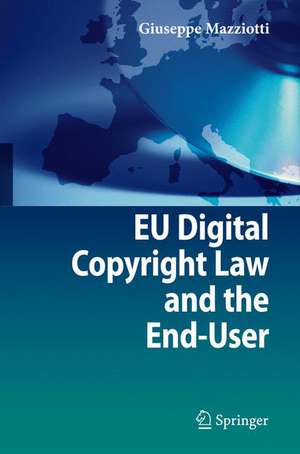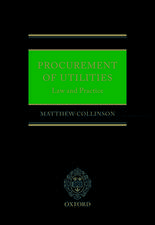EU Digital Copyright Law and the End-User
Autor Giuseppe Mazziottien Limba Engleză Hardback – 26 feb 2008
| Toate formatele și edițiile | Preț | Express |
|---|---|---|
| Paperback (1) | 640.53 lei 6-8 săpt. | |
| Springer Berlin, Heidelberg – 19 oct 2010 | 640.53 lei 6-8 săpt. | |
| Hardback (1) | 646.09 lei 6-8 săpt. | |
| Springer Berlin, Heidelberg – 26 feb 2008 | 646.09 lei 6-8 săpt. |
Preț: 646.09 lei
Preț vechi: 760.10 lei
-15% Nou
Puncte Express: 969
Preț estimativ în valută:
123.74€ • 127.49$ • 103.65£
123.74€ • 127.49$ • 103.65£
Carte tipărită la comandă
Livrare economică 24 februarie-10 martie
Preluare comenzi: 021 569.72.76
Specificații
ISBN-13: 9783540759843
ISBN-10: 3540759840
Pagini: 396
Ilustrații: XX, 374 p.
Dimensiuni: 155 x 235 x 30 mm
Greutate: 0.71 kg
Ediția:2008
Editura: Springer Berlin, Heidelberg
Colecția Springer
Locul publicării:Berlin, Heidelberg, Germany
ISBN-10: 3540759840
Pagini: 396
Ilustrații: XX, 374 p.
Dimensiuni: 155 x 235 x 30 mm
Greutate: 0.71 kg
Ediția:2008
Editura: Springer Berlin, Heidelberg
Colecția Springer
Locul publicării:Berlin, Heidelberg, Germany
Public țintă
ResearchCuprins
Copyright and Digitisation.- The impact of digitisation on the desirability of copyright exceptions.- EU Digital Copyright Law from the End-User Perspective.- Copyright harmonisation according to technological dictates.- The legal treatment of copyright exceptions under secondary EU law.- Digital copyright law: general policy issues under the EC Treaty.- Unsettled Issues.- Implications of sharing copyrighted works on the Internet.- Freedom of use vs. DRM Technology.- Working Solutions in the EU Copyright System.- Copyright policy alternatives for preserving end-user freedom of expression and information.- Conclusion: towards a better EU copyright law.
Recenzii
From the reviews:
"This book by Giuseppe Mazziotti draws on the contents of his PhD thesis. In general, it considers the intersection between copyright law and digital technologies. … The formula of the book is uncomplicated yet effective. … it is well sustained by a wide-ranging bibliography and reasonable index. ... is a worthy recommendation for law libraries. … it will interest students and academics involved with copyright law and technological developments. It will also be of great interest for copyright lawmakers in the European Union […]." (Ghufran Sukkaryeh, European Intellectual Property Review, Vol. 30 (II), 2008)
"[...] useful […] for anyone wanting to understand the workings and implications of the EU InfoSoc Directive, in effect Europe's DMCA. More important, Mazziotti points out that the InfoSoc Directive and the application of the 3-step test for exceptions have potentially gutted certain rights to make a private copy under the European private copying schema. Instead, he argues for more robust user-rights for both transformative and non-transformative uses. I support this conclusion." (David Lametti, http://www.cipp.mcgill.ca/blog/category/entertainment-law/)
“The book is clearly written and thus provides well-structured argumentation. … Mazziotti makes recommendations on how the copyright law should be developed. … Mazziotti’s book offers an interesting approach to the European copyright debate. The author is well-informed and is able to skillfully describe the differences between different views.” (Niklas Bruun, IPRinfo, Issue 5, 2009)
"This book by Giuseppe Mazziotti draws on the contents of his PhD thesis. In general, it considers the intersection between copyright law and digital technologies. … The formula of the book is uncomplicated yet effective. … it is well sustained by a wide-ranging bibliography and reasonable index. ... is a worthy recommendation for law libraries. … it will interest students and academics involved with copyright law and technological developments. It will also be of great interest for copyright lawmakers in the European Union […]." (Ghufran Sukkaryeh, European Intellectual Property Review, Vol. 30 (II), 2008)
"[...] useful […] for anyone wanting to understand the workings and implications of the EU InfoSoc Directive, in effect Europe's DMCA. More important, Mazziotti points out that the InfoSoc Directive and the application of the 3-step test for exceptions have potentially gutted certain rights to make a private copy under the European private copying schema. Instead, he argues for more robust user-rights for both transformative and non-transformative uses. I support this conclusion." (David Lametti, http://www.cipp.mcgill.ca/blog/category/entertainment-law/)
“The book is clearly written and thus provides well-structured argumentation. … Mazziotti makes recommendations on how the copyright law should be developed. … Mazziotti’s book offers an interesting approach to the European copyright debate. The author is well-informed and is able to skillfully describe the differences between different views.” (Niklas Bruun, IPRinfo, Issue 5, 2009)
Textul de pe ultima copertă
This book is the first comprehensive exploration of the legal framework of EU digital copyright law from the perspective of the ‘end-user’. This multi-faceted actor of the digital environment is a consumer of copyrighted works, a file-sharer of these works on the Internet, and a possible follow-on creator, who builds upon pre-existing digitised materials. All of these activities raise significant issues for national, European and international legal systems.
The author critically evaluates the economic and legal consequences of the spectacular rise of user-generated content for existing copyright rules, with reference to human rights law, competition law and other important policies contained in the EC Treaty. He details policy options which would establish a balance between digital copyright law and the preservation of constitutionally-mandated end-user activities like personal use, private copying, educational and research activities and the unprecedented transformative uses enabled by digital technologies.
This book is essential reading for lawyers, policymakers and academics interested in copyright law, competition law concerning digital media and information technology, consumer digital rights, Internet governance, freedom of expression and user data protection in digital settings.
The author critically evaluates the economic and legal consequences of the spectacular rise of user-generated content for existing copyright rules, with reference to human rights law, competition law and other important policies contained in the EC Treaty. He details policy options which would establish a balance between digital copyright law and the preservation of constitutionally-mandated end-user activities like personal use, private copying, educational and research activities and the unprecedented transformative uses enabled by digital technologies.
This book is essential reading for lawyers, policymakers and academics interested in copyright law, competition law concerning digital media and information technology, consumer digital rights, Internet governance, freedom of expression and user data protection in digital settings.
Caracteristici
Includes supplementary material: sn.pub/extras









